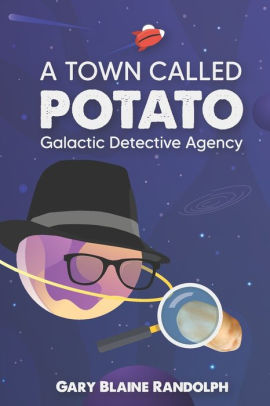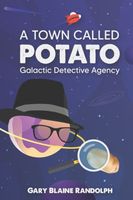- Series
- | Authors
- | Book Release Calendar
- | Search |
- Genres
- | Newsletter
- Welcome to FictionDB, Guest
- | My Account
- | Help

A Town Called Potato — Gary Blaine Randolph

-
Published:
May-2020 -
Formats:
Print / eBook / Audio -
Series:
-
Main Genre:
Law Enforcement -
Pages:
207 -
Purchase:
-
Share:
It's a lighthearted murder mystery ... with space aliens! Gabriel Lake is a not so hard-boiled computer guy who finds himself swept up into a web of interstellar crime when he is recruited into the Galactic Detective Agency, led by the brilliant Oren Vilkas. Can a mere Earthling track a killer across the stars before more lives are lost? Can he negotiate his way around other worlds and understand the ways of extra-terrestrial cultures? Can he even figure out how to use a bathroom designed for aliens? And can he uncover the mystery of A Town Called Potato? INTERVIEW WITH THE AUTHOR Q. How did you come up with the title A Town Called Potato?A. I didn't. It was a random thing one of my grandsons said at eight years old one day while we were playing. I often keep track of funny things my grandkids say, but this one really stuck with me. I kept thinking about that town and why it might be called Potato. I already knew I wanted to write a comedy sci-fi story, and the title just seemed to fit. The book evolved from that, and I named the protagonist after my grandson. Q. What authors inspired you in writing A Town Called Potato?A. Given that the story is a mash-up of comedy sci-fi and detective fiction, authors from each of those genres inspired me. In detective fiction, I love Rex Stout's Nero Wolfe books. In fact, it isn't too hard to see that Oren Vilkas is a homage to Nero Wolfe. And it was Rex Stout, along with Sue Grafton and Arthur Conan Doyle, who inspired me to write the book in first person. Of course when you think of comedic sci-fi, Douglas Adams is the king, and I have tried to capture a fraction of his sense of imaginative. Terry Pratchett is another comedic writer who has always inspired me with his brilliance. And I have to mention P. G. Wodehouse the OG of character-driven comedy novels. Q. Did you find it difficult to mash up so many genres?A. I did at first. I kept veering off just into comedy or just into detective noir. So it needed a few passes through the text to make sure I got all the boxes ticked and to get into the swing of things. I wanted Gabriel Lake to be so infused with detective fiction that his inner monologue just naturally takes on the cadences of film noir. The trick was to make that comedic and not just cheap parody. I think I found the balance by making Gabriel self-effacing in describing his fish-out-of-water adventures in space and in bringing everyone else in on the joke as well. By the end I found it easier to find Gabe's voice, and as I got into the sequel, The Maltese Salmon, it started feeling more and more like home. Q. Where did you get the idea for the chrono engine?A. Every sci-fi novel that deals with interstellar travel has to deal with how to cross the mind-boggling vast expanses of space. You can devise some kind of faster-than-light travel (warp drive, hyperspace, etc.), or hypothesize traversable wormholes, or imagine a constant acceleration drive that achieves some significant fraction of light-speed, or have generation/sleeper ships. But I was shooting for comedy sci-fi. I knew I needed some preposterous tongue-in-cheek technology, something Douglas Adams might come up with. So I thought for a long time about What Would Doug Do? My answer with the chrono engine weaves together a wee bit of hard science (the fact that the universe used to be mush smaller) with the most outrageous hand-waving technobabble that I could come up with. I hope it makes you chuckle.
Genres
Themes
People / Creatures
Click on any of the links above to see more books like this one.

